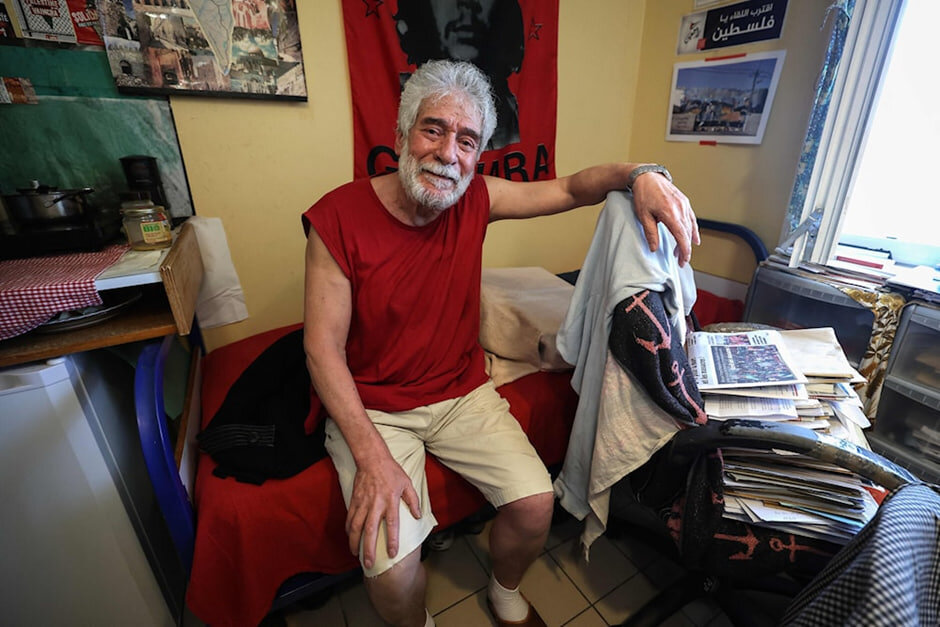Georges Abdallah set to arrive in Beirut this week

BEIRUT—After more than 40 years of arbitrary detention, a French court on Thursday ordered the conditional release of Lebanese leftist activist Georges Abdallah, 74, who is being held in France on alleged charges of assassinating an Israeli diplomat and an American in 1982.
The ruling is the culmination of a long legal and political struggle waged by Abdallah’s supporters, which played a decisive role in the decision to release him.
Abdallah praised this role during his meeting with French radical leftist MP Andrée Touraine in his cell at Lannemezan prison in southern France, noting that “the reason for his release is a comprehensive dynamic mobilization of men and women abroad.”
Based on the French judicial decision, Abdallah, who is considered one of the longest-serving prisoners in France and the world (arrested in 1984), will be released on July 25.
Jean-Louis Challancet, Abdallah’s lawyer, stated that the court upheld the conditional release ruling, requiring Abdallah to leave France for Lebanon immediately if the French authorities (Western or specifically American) do not place new obstacles to the implementation of the decision.
It was noteworthy that Israel’s embassy in Paris expressed its “regret” over the French judiciary’s decision, claiming that Georges Abdallah “is a terrorist responsible for the murder of Israeli diplomat Yaakov Bar Siman-Tov, in front of his wife and daughter, and American diplomat Charles Ray.”
“Terrorists like these, enemies of the free world, should spend their lives in prison,” the occupation regime’s embassy added.
Abdallah has repeatedly rejected the characterization of what happened as a “terrorist act,” instead lumping it with acts of “resistance” during the Israeli invasion of southern Lebanon in 1978.
Meanwhile, Hanna Gharib, secretary-general of the Lebanese Communist Party, warned of “the possibility of Israel assassinating Georges Abdallah upon his arrival in Lebanon,” stressing that “the Lebanese state is responsible for his protection.”
Other observers attributed the reason to Paris’s refusal to allow Georges Abdallah to deliver a speech criticizing their brutal and bloody imperialist policies from French soil. According to Western logic, a hero is not a hero if he is “anti-Semitic” and dislikes “Israel” and its bloody policies. What is required is by transferring Abdullah directly to Beirut is a preemptive step to prevent the freed man from delivering a revolutionary speech from the heart of Paris, criticizing Western imperialist policies that support Israeli barbarism, and thus being portrayed in international newspaper headlines as a revolutionary hero who triumphed after four decades of oppression.
Those behind the decision to imprison Georges Abdallah for over 40 years are convinced that they were unable to “discipline” the heroic man, a hero who rejected colonialism in both word and deed, establishing a generation from whom they would learn that colonialism is not destiny and that all peoples can do is resist.
Hezbollah pointed out that the forty-one years spent by Georges Abdallah in French prisons have constituted a damning indictment of the “state of law, justice, freedoms, and protection of human rights,” placing it in the category of blind bias toward the interests of Washington and Tel Aviv.
Georges Ibrahim Abdallah was born in 1951. In 1970, he joined the ranks of the Palestinian resistance in defense of the Lebanese and Palestinian peoples, successfully carrying out precise operations against the Israeli enemy.
In 1984, he was arrested in the French city of Lyon and sentenced to four years in prison. In 1986, he was sentenced to another four years. Although he met the legal conditions for his release in 1999, American and Israeli pressure prevented his release.
In historical myths, historians tend to describe heroes with elaborate artistic plots. The task of chronicling the lives of contemporary heroes is more complex. Among them is Georges Abdallah, who led the resistance in his cell for more than 40 years without wavering. He was a man of steadfast revolutionary principles and foundations in a time when failure was widespread, prevalent, and tyrannical.
Leave a Comment